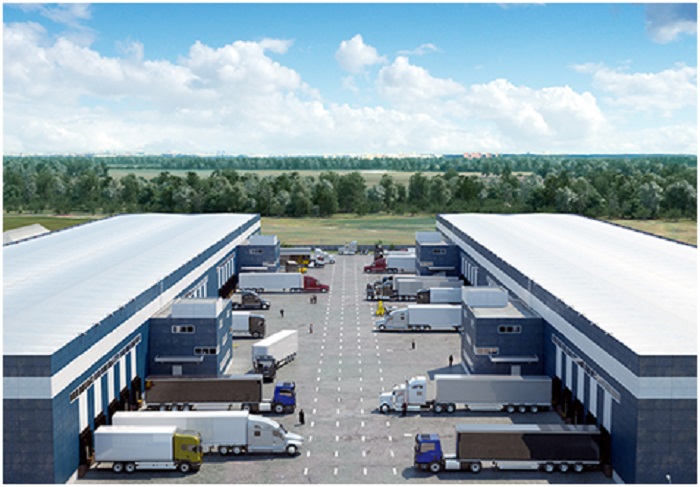



China has so far built over 2,000 overseas warehouses to boost the development of cross-border e-commerce, with their total area exceeding 16 million square meters and service network covering the entire world.
Overseas warehouses have grown alongside the expansion of cross-border e-commerce, said Zhou Wuxiu, secretary general of the cross-border e-commerce and overseas warehouse branch of China Association of Warehousing and Distribution (CAWD).
In particular, regions that witnessed relatively rapid growth of cross-border e-commerce orders and enjoy solid logistics infrastructure, such as North America and Europe, have become preferred choices for overseas warehouses, Zhou added.
As China’s trading partners become increasingly diverse, the global network of overseas warehouses is further expanded and extended.
Goodcang, an overseas warehouse firm owned by Chinese overseas warehousing and logistics service provider Zongteng Group, has built a cross-border e-commerce logistics network covering more than 30 countries in six continents, according to Li Cong, vice president of Zongteng Group.
The total area of overseas warehouses operated by Goodcang has exceeded 1 million square meters, Li disclosed.
The company’s warehouses in Britain handle up to 180,000 orders on a daily basis and can receive nearly 40,000 containers a year. Its warehouse in Birmingham, Britain, which is equipped with automated sorting system, is running in good order.
Some Chinese enterprises have actively explored emerging markets and participated in the joint building of the Belt and Road Initiative (BRI), including the China National Building Materials and Equipment Import and Export Corporation, a wholly-owned subsidiary of China National Building Material Group Co., Ltd. (CNBM).
While actively building Okorder.com, a cross-border e-commerce platform for trade in building materials, the company has set up six overseas warehouses in countries along the routes of the BRI, including the United Arab Emirates, Vietnam, and Pakistan, achieving coordinated development of cross-border e-commerce and overseas warehouses and establishing an overseas warehousing network covering regions including the Middle East, Africa, and Southeast Asia.
In November 2021, Cainiao Network, the logistics arm of China’s Alibaba Group, put into operation a smart logistics hub at Liege Airport in Belgium. The first phase of the project, which covers an area of over 30,000 square meters, includes air cargo terminal and distribution center.
As the total area of the overseas warehouse run by Cainiao Network in Madrid, Spain, has been expanded to more than 30,000 square meters, its amount of stock has risen by more than 200 percent.
Overseas warehouses have significantly improved efficiency in parcel delivery. According to Xiong Wei, assistant president of Cainiao Network and general manager of Cainiao’s export logistics division, even transported by air, it takes goods shipped directly from China six to 10 days to arrive in Spain; but if companies store products in an overseas warehouse in advance and have parcels delivered to buyers from the warehouse, 80 percent of the packages can reach their owners within 24 hours, over 95 percent of them can be delivered to buyers within three days, and some consumers can even receive the products they buy online the day they place the order.
Overseas warehouses have served as coordinator and buffer in smoothening and stabilizing global industrial and supply chains for foreign trade, pointed out Chen Yongxin, general manager of China National Building Materials and Equipment Import and Export Corporation.
Overseas warehouses exchange space for time, and by enabling foreign trade companies to have goods prepared for delivery in advance, can smoothen production and distribution cycles and avoid unexpected risks, such as the shutdown and transportation disruption caused by the COVID-19 pandemic, Chen said.
These warehouses have shortened the distance between goods and their target markets, thus making it more convenient to carry out marketing and promotional activities and increase the chance of spot trade, according to Chen.
In addition, by providing after-sales service, including exchange, return, and repair of goods, overseas warehouses can help foreign trade companies reduce costs and improve customer satisfaction, Chen added.
The annual operating revenue of overseas warehouses under China National Building Materials and Equipment Import and Export Corporation has exceeded 1 billion yuan ($157.6 million). They are now the core hub maintaining and stabilizing industrial and supply chains for the company’s foreign trade.
In recent years, as cross-border e-commerce flourishes, a good number of overseas warehouses have seized the opportunity to pursue innovation and development, constantly improving their global layout, service diversification, and intelligentization.
Last year, the first phase of Zongteng Group’s smart warehouse project was launched in Britain and the U.S., with the planned area reaching 50,000 square meters. A total of 300 autonomous mobile robots (AMRs) have been put into use at the warehouses of the project. They can carry 600 kilograms of cargos, determine their path by identifying QR code on the ground, and move at a speed as high as 20 kilometers an hour.
Besides, by leveraging advanced technologies and applications concerning intelligent cargo handling, machine vision, big data and algorithm, these warehouses can automatically match orders with goods, relieving workers of the effort to find goods.
Smart warehouse is 2 to 3 times more efficient than traditional ones, and can reach an accuracy rate of 99.99 percent, Li said, adding that it can also cut manpower input by 50 percent and boasts highly efficient, safe, and environmentally friendly operation.
Zongteng Group will further improve the digitalization and intelligentization level of its overseas warehouses, innovate its logistics services and supply chain, and stimulate the vitality of cross-border e-commerce and overseas warehouses by adopting digital twin technology and launching a project to renovate old warehouses, according to Li.


The Humanitarian Service Diamond Awards has.
A Chinese Company, Inner Galaxy Steel.


The Programme Coordinator, Regulatory, Compliance and.


A Non-Governmental Organization (NGO), Committee for.
The Trustfund Pensions Limited has chided.


The House of Representatives Committee on.
The China General Chamber of Commerce.


Senator Chuka Utazi who represented Enugu.


An Abuja based Legal Practitioner, Ugochukwu.


The African business community in Yiwu,.
Leave a Comment